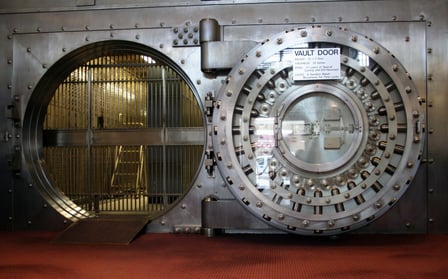What is the best gun safe for you?
Nathan asks:
I'm in the market for a gun safe, and have been reading as much as I can about the topic, but still am not sure which way to go. I thought a story/review by one of your writers about their experiences with safes might be helpful to folks. Is it worth going big $$$ for a name brand or saving some coin and getting a cheaper one from a big box store? Are electronic locks better/worse than dial combination locks? How much fire protection should I get? Any brands to stay away from? How much weight can I put on the second floor of my house safely? Can I put a safe in an unheated garage?
I don't personally have any experience with safes, but I do have a rather extensive background in risk analysis and lockpicking. And this, my friends, is a risk analysis question.
Gun safes are like an insurance policy --
You're setting out some money now so that you don't lose all of your stuff later. That much is common sense, but how much should you invest? Is it worth it to get the super deluxe gun safe? In order to get to that number analysts like to use something called the "annualized loss expectancy" and extrapolate from there.
Annualized loss expectancy is a fancy word for how much money you should expect to lose from something every year based on the national average. You can calculate it pretty easily for things like air accidents and terrorist attacks, but surprisingly it gets a little complicated for guns. The reason is that while we can calculate out how often (on average) you can expect your guns to be stolen the actual value of those guns varies so wildly that a standard figure is useless. So instead I'm going to take a more personalized approach.
Let me set the ground work first. FYI, these are going to be back-of-the-envelope calculations so take the results with a grain of salt, but the method is rock solid and should be used to figure out this for yourself.
The best numbers I could find report that 189,000 firearms are stolen every year. Another source claims about 80 million people own a gun in the United States. That works out to roughly a 0.24% chance that your guns will be stolen in a given year.
Similarly shoddy sources report that 397,650 dwelling fires happen every year, and while not every fire results in property damage it's a good enough number for me. The census bureau says that there are 131,704,730 dwellings in the US, meaning the chance of your residence being involved in a fire is 0.3%.
Since these events are joined by an "OR" operator (your gun can be stolen OR burned) we add the two percentages together to get 0.54%. By itself that doesn't tell us much, so we have to plug in a couple of things.
First we need the actual ALE, so multiply that number by the replacement value of your current arsenal -- how much it would cost if you were to buy everything factory fresh. For me that's right about $15,000 counting only firearms and not accessories and equipment, so my ALE is about $81. I should expect to lose $81 every year to firearms theft.
That may not seem right at first glance, but that's because the ALE is cumulative. If nothing is stolen and then my prized $3k Wilson Combat 1911 goes walkabout in 38 years I will have exactly met my ALE, since the combined expected loss for all those years is more than the replacement value of the gun.
The next number to plug in is how long you expect the security measures to last you. For me I'd expect a safe to last me a good 20 years, so I multiply my ALE by 20 and I come up with $1,620. Statistically speaking I should spend at least $1,620 on security because that's the amount of money I would lose anyway in those years from theft if I had done nothing.
Now that we have a budget we can take a look at what's out there
And in order to find the one that's the right fit for you we need to scope your threat. It's nearly impossible to account for every variation of attacker and fire scenario, so instead we narrow down the probable scenarios to the most likely set and work from there. And to make things easy we're only going to talk about fire and theft.
For theft, the things you have to think about most are means and time. Safes are designed to slow down attackers and require a certain level of equipment, but if given enough time and resources any safe can be successfully cracked. The question you have to ask yourself is how long will an attacker have to crack your safe, and what will they have with them? Personally, I see two scenarios here:
- A burglar randomly chooses to break into your house when you're not there. They stumble across your gun safe and decide to attempt to break it open. They have only the tools they brought with them plus anything they can find (and use) in your home. They don't know when you will be back so their attempt will be rushed and relatively unskilled, opting to steal the flat screen instead.
- The attacker has been watching your moves for days, plotting your habits and figuring out when you won't be home. They bring sophisticated equipment and a trained hand. In other words, you're screwed.
You can pretty easily guess which category you fall into. If you lead a relatively low profile life and don't open carry your M249 then chances are you'll get a call from Mr. #1. But if you're like our Fearless Leader who loves talking shop then #2 might be on the menu. The neighborhood you live in, the kind of car you drive, and the size of your dwelling can also influence which type of attacker chooses your home.
The common theme with both of these attack types is time. The more time the attacker has the more likely they are to succeed. So personally, rather than spending tons of money on that Fort Knox in your basement I'd invest in a good alarm system for your dwelling. Alerting the authorities immediately is the best way to keep your stuff safe, and while they may still be minutes away the acceptable quality safe you've purchased should probably keep them out until the cavalry arrives.
Fire is a whole different beast, and since I started firefighter training I've gained a whole new perspective on it.
The level of fire protection you need will depend on where you put the safe.
- Basement -- This is the worst place for your safe. If your house burns down, just like a campfire the place that stays the hottest the longest will be the bottom (your basement). It's also a bitch to get at to fight a fire, so if your basement is on fire you can probably kiss anything in it goodbye. Like all things this depends on your specific house design, but in general if you're going for a basement placement you should focus your spending on fire protection.
- Upper Level -- In general fires on the upper level aren't as bad as fires in the basement, but due to the weight of the safe you have to think about the possibility of the safe falling through a weakened floor and landing in the basement anyway.
- Garage / Outbuilding -- This is the best placement for a safe in terms of fire protection, but garages and outbuildings typically are less secure than the main residence and can increase the risk from theft. Fire protection should be a secondary concern in these locations.
Safes are rated for temperature and duration, so a safe that is rated to last a short while at extreme temperatures will last much longer at lower temperatures.
The last consideration is size. If you only have one handgun and keep it on you at all times, something like a small bedside safe might be a good idea to keep it secure from unauthorized users. But a safe that small can still be taken away, and once under someone else's control can be opened at their leisure. Small safes should only be considered as temporary storage if you're not going to be leaving the gun unattended in such a way that intruders can get at it for long periods of time.
So, having said all that let me try and answer your direct questions:
Is it worth going big $$$ for a name brand or saving some coin and getting a cheaper one from a big box store? Check your annualized loss expectancy and base your own answer off of that number. Just remember the cheaper the safe, the less fire and theft protection you get.
Are electronic locks better/worse than dial combination locks? Electronic locks allow quick and easy access to your guns, but they will fail if they run out of electricity or their mechanism melts. Mechanical combination locks generally stand up to heat much better, as well as the water that comes with putting out a fire, and there are no secret unlock combinations or backdoors possible. I'd go mechanical myself. But most electronic locks do have a backup power source and if you are in and out of your safe regularly then the convenience and quickness of an electronic lock might be for you.
How much fire protection should I get? Depends on where you're putting your safe. For the basement you're going to need every bit you can afford. For a garage you're going to want to focus on harder to crack safes instead.
Any brands to stay away from? Check the reviews from reputable websites, and our readers will doubtless have some answers for you. But personally I can't recommend against any. If you are looking for high quality and American made though Rhino Safes are some of the best out there. They also have a great Youtube page with many videos explaining how safe's work and how they can be cracked.
How much weight can I put on the second floor of my house safely? Depends on the construction of your house and what else is on that floor, but the standard "live load" maximums for a household is 40 pounds per square foot.
Can I put a safe in an unheated garage? Yes. Your guns will just be colder in the winters, so knit them a sweater. Heat might also be an issue with wooden guns and their finish, so be aware.



